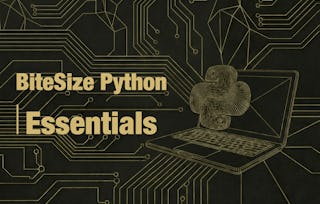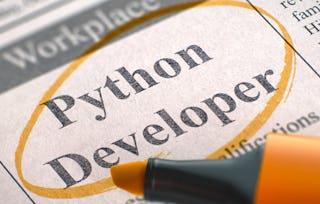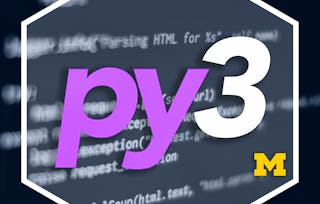Python has been the growing and most sought-after programming language of the past decade. In this course, you’ll start your journey as a Programmer with Python. This course requires zero experience in programming or coding. This course will teach foundational concepts such as data types, operators, functions, and basic Python internals. After each module, you’ll enjoy access to practice questions to better understand the concepts.

Python for the Absolute Beginner

Python for the Absolute Beginner
This course is part of DevOps Mastery Specialization

Instructor: Lydia Halie
3,657 already enrolled
Included with
29 reviews
Skills you'll gain
Details to know

Add to your LinkedIn profile
8 assignments
See how employees at top companies are mastering in-demand skills

Build your subject-matter expertise
- Learn new concepts from industry experts
- Gain a foundational understanding of a subject or tool
- Develop job-relevant skills with hands-on projects
- Earn a shareable career certificate

There are 9 modules in this course
This module serves as an orientation and provides participants with essential knowledge and skills to get started with Python programming. Learners are introduced to the course content, structure, and objectives. They gain an understanding of what to expect from the course and the skills they will acquire upon completion. Next, learners are introduced to the syntax and basic concepts of Python.Through hands-on labs, they gain practical experience in using the print function to display output, working with different types of literals, and understanding various operators for performing operations in Python. Learners understand variables, comments, input functions, and string methods, enabling them to write basic Python programs efficiently.
What's included
10 videos9 readings1 assignment
The "Decision Making in Python" module focuses on teaching participants how to make decisions in Python programs using comparison operators and conditional statements. Participants learn about various comparison operators and how they can be used to compare values in Python. Through hands-on labs, participants practice using comparison operators to make decisions based on different conditions. The module also covers conditional statements such as if, elif, and else, allowing participants to control the flow of execution in their Python programs based on specific conditions.
What's included
2 videos2 readings1 assignment
The " Iteration in Python" module introduces participants to the concept of loops in Python, including both while and for loops. Participants learn how while loops are used to iterate over code blocks based on specific conditions, allowing for repetitive execution. Through hands-on lab exercises, participants practice implementing while loops to gain practical experience.
What's included
2 videos2 readings1 assignment
The "Exploring Logic and Bit Operations in Python" module introduces participants to logic and bitwise operators in Python. Participants learn how logic operators such as AND, OR, and NOT are used to perform logical operations and make decisions in Python programs. Through hands-on lab exercises, participants practice implementing logic operators to evaluate conditions effectively. Additionally, the module covers bitwise operators, which are used to perform bitwise operations on binary numbers. Participants develop proficiency in using bitwise operators through further hands-on lab exercises.
What's included
2 videos2 readings1 assignment
This module covers the fundamental concept of lists in Python and various operations associated with them. Participants learn about the versatility of lists and how they can be used to store and manipulate data effectively. Through hands-on lab exercises, participants gain practical experience in using list methods to perform common operations. The module also covers iteration techniques for accessing and processing list elements, as well as slicing methods for extracting subsets of elements based on specific criteria. Additionally, participants explore nested lists and learn how to work with 2D and 3D nested list structures through hands-on labs.
What's included
8 videos7 readings1 assignment
The "Python Functions" module introduces participants to the concept of functions in Python and their significance in code organization and reusability. Participants learn how to define and call functions to encapsulate reusable code blocks, promoting modularity and maintainability. Through hands-on lab exercises, participants gain practical experience in working with function arguments, including positional and keyword arguments. Additionally, participants learn about the return statement and its role in returning values from functions, enabling them to write more efficient and structured Python code.
What's included
6 videos6 readings1 assignment
The "Python - Tuples & Dictionaries" module covers two fundamental data structures in Python: tuples and dictionaries. Participants learn about tuples, immutable ordered collections of data, and how to effectively manipulate them. The module also explores dictionaries, key-value pair data structures, and their role in efficient data storage and retrieval. Through hands-on lab exercises, participants acquire practical skills in working with both tuples and dictionaries, enabling them to utilize these data structures effectively in Python programming.
What's included
2 videos2 readings1 assignment
The "Exceptions" module delves into errors and exceptions in Python, essential concepts for handling unexpected situations in code execution. Participants learn about the different types of errors and exceptions that can occur in Python programs, along with their hierarchical structure. Through interactive content, participants are challenged to test their knowledge of errors and exceptions through a quiz. This module provides a comprehensive understanding of how to identify, categorize, and handle errors and exceptions effectively in Python programming.
What's included
2 videos1 assignment
The "Python Internals and Conclusion" module offers participants a deeper understanding of Python's internal mechanisms, shedding light on its interpreter, execution model, and underlying architecture. Participants explore the inner workings of Python, gaining insights into its design principles and core concepts. Additionally, the module provides a conclusion to the course, summarizing key takeaways and reinforcing learning outcomes.
What's included
2 videos1 reading
Earn a career certificate
Add this credential to your LinkedIn profile, resume, or CV. Share it on social media and in your performance review.
Instructor

Offered by
Explore more from Software Development
 Status: Free Trial
Status: Free Trial Status: Free Trial
Status: Free TrialUniversity of Colorado Boulder
 Status: Free Trial
Status: Free TrialRice University
 Status: Free Trial
Status: Free TrialUniversity of Michigan
Why people choose Coursera for their career

Felipe M.

Jennifer J.

Larry W.

Chaitanya A.
Learner reviews
- 5 stars
79.31%
- 4 stars
10.34%
- 3 stars
3.44%
- 2 stars
0%
- 1 star
6.89%
Showing 3 of 29
Reviewed on Jun 2, 2025
Best Course at Beginner level. Students can learn basic concepts even with a zero knowledge about python

Open new doors with Coursera Plus
Unlimited access to 10,000+ world-class courses, hands-on projects, and job-ready certificate programs - all included in your subscription
Advance your career with an online degree
Earn a degree from world-class universities - 100% online
Join over 3,400 global companies that choose Coursera for Business
Upskill your employees to excel in the digital economy
Frequently asked questions
To access the course materials, assignments and to earn a Certificate, you will need to purchase the Certificate experience when you enroll in a course. You can try a Free Trial instead, or apply for Financial Aid. The course may offer 'Full Course, No Certificate' instead. This option lets you see all course materials, submit required assessments, and get a final grade. This also means that you will not be able to purchase a Certificate experience.
When you enroll in the course, you get access to all of the courses in the Specialization, and you earn a certificate when you complete the work. Your electronic Certificate will be added to your Accomplishments page - from there, you can print your Certificate or add it to your LinkedIn profile.
Yes. In select learning programs, you can apply for financial aid or a scholarship if you can’t afford the enrollment fee. If fin aid or scholarship is available for your learning program selection, you’ll find a link to apply on the description page.
More questions
Financial aid available,

